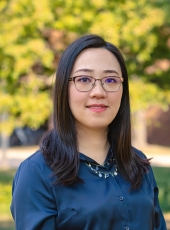Michigan Tech professor Jun Dai wants to change the way accountants do their work and how the rest of us think about it.
The days of Scrooge are over. While the ledgers and ink of old are long gone, the ghost of accounting's future is rattling chains of complex processes that instill a lingering dread in students, especially as digital transactions continue to grow. Dai, assistant professor of accounting in Michigan Technological University’s College of Business, wants to better use technology and accounting information systems (AIS) to put old-school attitudes to rest.
About the Researcher
Q: Where is your research focused?
JD: My current research explores how to apply new technologies such as blockchain, industry 4.0 and data analytics to the accounting and auditing professions. To many people, the accounting profession means tedious work and long, intense hours. My research aims to change it to a valued and fun job by using technologies that free accountants and auditors from routine and time-consuming work, as well as to provide investors and managers more accurate, timely and forward-looking information to support financial decisions.
Q: What inspired you to get started in this work?
JD: I majored in management information systems (MIS) when I was an undergrad. At that time my friends, who majored in accounting, always complained about tedious and complex accounting processes. When I heard them describing those processes, I figured many of them could be accelerated and improved by what I learned in MIS; basically using computers and IT systems to replace a lot of labor. I also thought that using technologies could accomplish things that could not be done in the auditing processes at that time, such as validating all transactions rather than a sample of them. Later, I pursued my Ph.D. at Rutgers University and did research on finding out how that could be done.
What is blockchain technology?
Blockchain is a digital ledger shared within a protected network. Inside that network, business assets can be quickly but securely traded and tracked. Old accounting processes rely on backup records and third-party validations, which can take longer to work through. Blockchain’s built-in speed and transparency, which Dai works on, crosses T’s and dots I’s more efficiently.
Q: What role does technology play in your research?
JD: Technologies play the key role of collecting a variety of financial and non-financial data. Then, they process and build intelligent models on that data to discover potential business risks and opportunities. It’s also key that this information is presented in a human-readable manner so that accountants, managers or investors without a strong technology background can understand.
Q: What trends are you seeing in your field?
JD: I have seen tremendous growth in the field of accounting information systems (AIS) — the field I work in — over the last five years. This field explores how big data, artificial intelligence, blockchain technology and the Internet of Things can improve accounting and auditing tasks. When I started my Ph.D. study 10 years ago, few people understood the research I was doing. Now it has become well-accepted by both academia and industry. I am very happy to see this trend.
AAA Award
Dai received the 2021 American Accounting Association Notable Contributions to Accounting Literature Award for a research article titled “Toward Blockchain-Based Accounting and Assurance.” In it, she explores how blockchain technology could reengineer the existing accounting and auditing procedures to make them more transparent, intelligent and automated.
Q: What challenges do you face?
JD: Since AIS is an emerging field, there are a lot of challenges. First, standards and regulations fall behind the advances in technologies and their use in accounting and auditing. How technologies can be used under the umbrella of standards and regulations, or how standards and regulations should be changed to adapt to the fast growth of technologies, are quite challenging topics.
Also, we say “technologies give, technologies take,” meaning technology brings a lot of new risks along with benefits. How those new risks should be controlled and handled is challenging.
Lastly, as technologies become more extensive, privacy and security issues become critical.
Q: How does your research influence your teaching?
JD: Companies and audit firms recently put in effort to use technologies in their accounting and auditing practices. I am passionate about this field, so I do my best to incorporate related content in my teaching. I teach a course named Accounting Analytical Methods, which walks students through hot technologies that are used, or have the potential to be used, in the accounting world. I love preparing students for the transformation happening in the real world before they enter into it.
The class also has a term project that asks students to come up with their own research ideas regarding the use of technologies in accounting. I often get inspired by their ideas and may continue working with them to develop the research.
Q: How do you think your research will impact the future?
JD: I explore how blockchain technology could reengineer the existing accounting and auditing procedures to make them more transparent, intelligent and automated. I believe this is the future of the accounting profession. I also have another work imagining a future diagram change in the auditing profession (we call it Audit 4.0), which piggybacks on technologies promoted by Industry 4.0.
I believe the accounting and auditing professions will be changed toward a more advanced diagram with extensive use of technologies, and I am seeing its start.
Michigan Technological University is an R1 public research university founded in 1885 in Houghton, and is home to nearly 7,500 students from more than 60 countries around the world. Consistently ranked among the best universities in the country for return on investment, Michigan's flagship technological university offers more than 185 undergraduate and graduate degree programs in science and technology, engineering, computing, forestry, business, health professions, humanities, mathematics, social sciences, and the arts. The rural campus is situated just miles from Lake Superior in Michigan's Upper Peninsula, offering year-round opportunities for outdoor adventure.







Comments